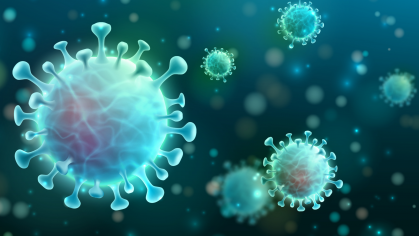Cardiac MRI Effective in Detecting Inflammation of the Heart in Athletes Who Had COVID-19

Cardiac magnetic resonance was highly effective at detecting inflammation and allowed athletes to resume their sport if screenings were normal, say Rutgers researchers
A cardiac MRI of athletes who had COVID-19 is seven times more effective in detecting inflammation of the heart than symptom-based testing, according to a study by researchers at Rutgers and 12 other Big Ten programs.
The findings are published online by JAMA Cardiology.
The study of 1,597 COVID-19 positive Big Ten athletes who had cardiac magnetic resonance (CMR) screening found 2.3 percent were diagnosed with myocarditis and most didn’t exhibit symptoms of the rare disease, a leading cause of sudden death in competitive athletes. Of the 37 athletes diagnosed with myocarditis, 28 were asymptomatic.
This is the largest study of college athletes and comprehensive cardiac evaluation including cardiac MRIs.
In September 2020, the Big Ten Conference mandated advanced testing for all COVID-19 positive athletes before they could return to play, citing studies that showed myocardial inflammation in patients who recovered from COVID-19. The incidence of sudden cardiac death in collegiate athletes has been estimated at one per 50,000 per year. Myocarditis is usually caused by a viral infection and is more common in males than females.
The conference formed the Big Ten COVID-19 Cardiac Registry to gather scientific data to help establish guidelines on when players could safely resume playing sports.
“COVID-19 has presented us with many challenges as the infections seems to affect different people in different ways. Our athletes rely on a heavy workload from their cardiovascular system to excel at what they do. Knowing if COVID-19 infection could have affected an athlete's heart is of utmost importance to allowing these young men and women to compete safely,” said coauthor Jason Womack, chief of the Division of Sports Medicine and associate professor in the Department of Family Medicine and Community Health at Rutgers Robert Wood Johnson Medical School. Womack is a Rutgers site coprincipal investigator, along with Carrie Esopenko, assistant professor in the Department of Rehabilitation and Movement Science at Rutgers School of Health Professions, who was a coauthor of the study.
Thirteen Big Ten universities agreed to share data about athletes with COVID-19 from March 1, 2020, to Dec. 15, 2020. The study focused on the results of athletes who had cardiac screenings, which included CMRs, electrocardiograms (electrical signal of the heartbeat), echocardiograms (an ultrasound of the heart) and blood tests to evaluate for myocardial inflammation or injury. Researchers found that CMR was highly effective at detecting both symptomatic and asymptomatic myocarditis as well as allowing athletes to immediately resume their sport if screenings were normal. With this protocol, 97.7 percent of the Big Ten athletes were cleared to return to exercise and competition.
“This research will help lead the way to determine the best way to monitor our athletes after infection with COVID-19. If we can accurately identify the athletes that will develop myocarditis, we are taking large strides to preventing a severe adverse outcome when they resume athletic activity,” Womack said.
The researchers recommended further studies evaluating which athletes would benefit from CMR testing following COVID-19 infection. The next step is a core analysis of the data by experts from the Big Ten participating institutions who specialize in interpreting CMRs, echocardiograms and electrocardiograms, Womack said. This analysis can help better predict which athletes have cardiac abnormalities to standardize CMR protocols and interpretation and determine when athletes can safely return to play.



